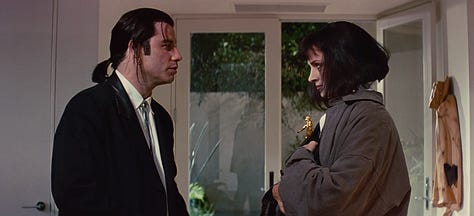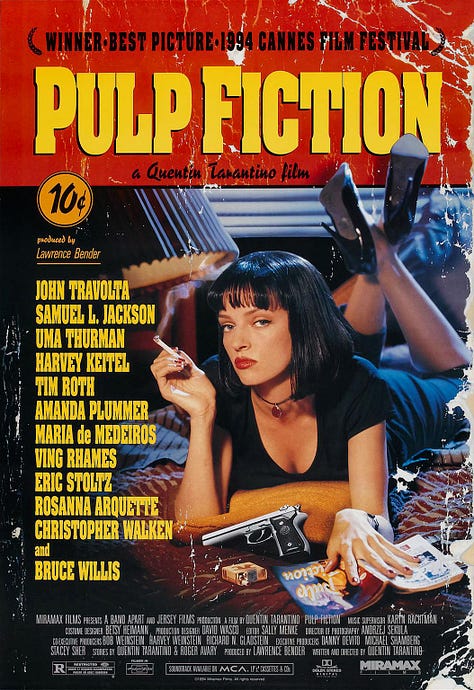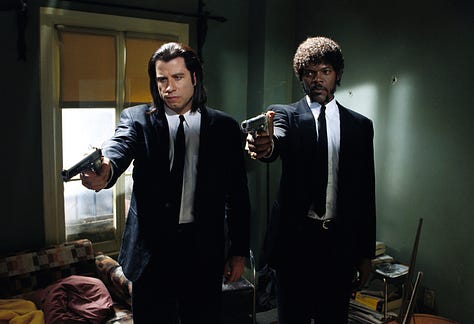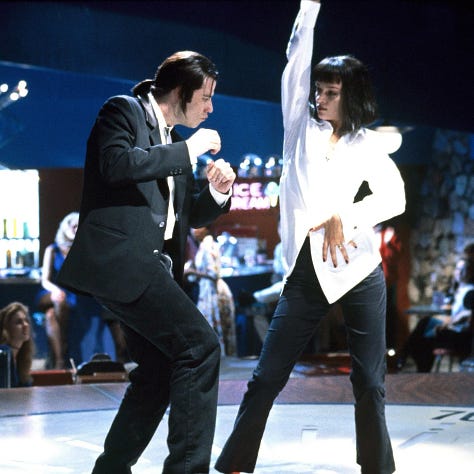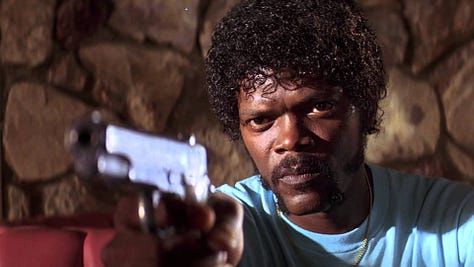PULP FICTION
1994 • Quentin TarantinoCast: John Travolta, Samuel L. Jackson, Uma Thurman, Harvey Keitel, Tim Roth, Amanda Plummer, Maria de Medeiros, Ving Rhames, Eric Stoltz, Rosanna Arquette, Christopher Walken, Bruce Willis
Screenplay: Quentin Tarantino; Story by Quentin Tarantino, Roger Avary
Cinematography: Andrzej Sekuła
Miramax Films
I'm sorry, did I break your concentration?
While Reservoir Dogs, was Quentin Tarantino’s first feature-length motion picture, it is with Pulp Fiction that he, guns blazing, blasted himself into the mainstream. Tarantino, known for interweaving different stories in a non-linear fashion, does the same with his 1994 magnum opus. The film opens with two hitmen, Vincent Vega (John Travolta) and Jules Winnfield (Samuel L. Jackson), on orders to retrieve a mysterious briefcase. Their job becomes more complicated than they imagine when corpses start to pile up. Meanwhile, boxer Butch Coolidge (Bruce Willis) is paid by gangster Marsellus Wallace (Ving Rhames) to throw a fight, but he decides to double-cross him to win the match (and some money by betting on himself). We also follow Mia Wallace (Uma Thurman), Marsellus's wife, who forms a complex connection with Vincent during an evening out which includes dancing, uncomfortable silences, and LOTS of heroin.
Quentin Tarantino's reputation as a masterful writer of dialogue is exemplified in Pulp Fiction, where he blends seemingly mundane conversations with intense, violent scenarios. One famous example occurs early in the film when hitmen Vincent and Jules engage in a casual discussion about fast food in Europe (“Royale with cheese.”) Unbeknownst to the audience at this point, the hitmen are on their way to kill some poor souls who double-crossed their boss. This juxtaposition of the ordinary and the extraordinary serves to humanize these characters who, in any other context, might be perceived as ruthless criminals. The Royale with Cheese discussion makes you kinda like these guys. This deliberate choice to delve into the minutiae of everyday life is something found in many of Tarantino’s scripts. Tarantino challenges traditional character archetypes, portraying his protagonists as individuals with quirks, preferences, and opinions on pop culture (usually from the 60s and 70s). The seemingly irrelevant nature of their talk contributes to the film's unpredictability. It heightens the impact for when things take a violent turn, jolting the audience’s attention.
Every performance in Pulp Fiction is A+ caliber: Uma Thurman and Ving Rhames were working actors that became household names after this film. Bruce Willis gives a career-best performance (up to that point) as Butch Coolidge. But the highlights are John Travolta and Sam Jackson.
Pulp Fiction played a pivotal role in revitalizing Travolta's career. During the late 80s and early 90s, Travolta faced a series of box-office disappointments that led to a decline in his star power. However, his portrayal of Vincent Vega was his comeback role. Travolta's performance as the laid-back and somewhat enigmatic hitman was widely praised, and the film's critical and commercial success brought him back into the spotlight. The role not only showcased his acting abilities but also demonstrated his versatility as an actor, as Vincent Vega was a departure from the roles he had been known for in previous years. The iconic dance scene featuring Travolta and Uma Thurman, set to Chuck Berry's "You Never Can Tell," further endeared him to audiences and became one of the memorable moments in the film, and probably of the 1990s. It’s almost as if audiences couldn’t remember Saturday Night Fever, and forgot Travolta is an incredible dancer.
Samuel L. Jackson's Jules Winnfield is, in a word, iconic. Perhaps one of the Top 100 greatest performances of all time. Sam Jackson had been around forever, in small roles in bigger films like Coming to America, Goodfellas, Do the Right Thing and Jurassic Park. But Pulp Fiction rocketed him to superstardom. You don’t get Nick Fury in the Marvel movies without Jackson’s Pulp Fiction performance. Jackson’s Jules Winfield was cool, charismatic, funny… and terrifying. His delivery of the "Ezekiel 25:17” passage is both captivating and ominous. With all due respect to the legendary Martin Landau in Ed Wood, that year’s Best Supporting Actor trophy should have gone to Jackson.
I can only speak for myself, but when I first saw this film at 14 years old, on a bootleg VHS tape (dubbed from a Laserdisc with Korean subtitles), I finally had my eyes opened that moviemaking could be an art form. Until then, I just thought movies were pure entertainment and didn’t pay attention to the artistry behind them. Pulp Fiction opened my eyes. I had never seen anything so stylish and, well, cool. The film's aesthetic, from its cinematography to its eclectic soundtrack, exuded a sense of coolness and originality. The non-linear narrative structure was a bold and innovative choice. Tarantino interwove multiple storylines, creating a puzzle that demanded active engagement. The cinematography, the dialogue, the shots, the transitions, the editing… all of it was something I couldn’t even comprehend was possible. Clearly, I wasn’t alone as Pulp Fiction created a string of lame copycats that littered the 90s indie film landscape.
Pulp Fiction went on to win the Palme d'Or at the 1994 Cannes Film Festival and was nominated for seven Academy Awards including Best Picture, Best Actor (Travolta), Supporting Actor (Jackson), and Supporting Actress (Thurman). It walked away with the Oscar for Best Screenplay. The film became a cultural phenomenon, solidifying Tarantino's status as a groundbreaking filmmaker and 1990s pop culture icon.
Zed's dead, baby. Zed's dead.
Notable Awards & Accomplishments
Academy Award Winner: Best Screenplay
Academy Award Nominee: Best Picture
Academy Award Nominee: Best Director
Streaming: MAX, DirecTV
Digital Rental/Purchase: Available at major digital retailers
Physical Media: Available on 4K, Blu-Ray and DVD
